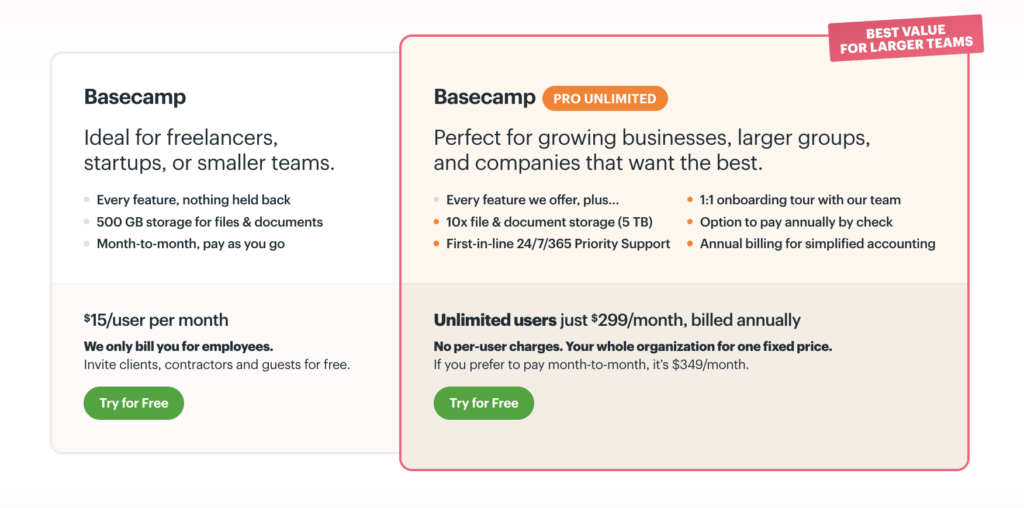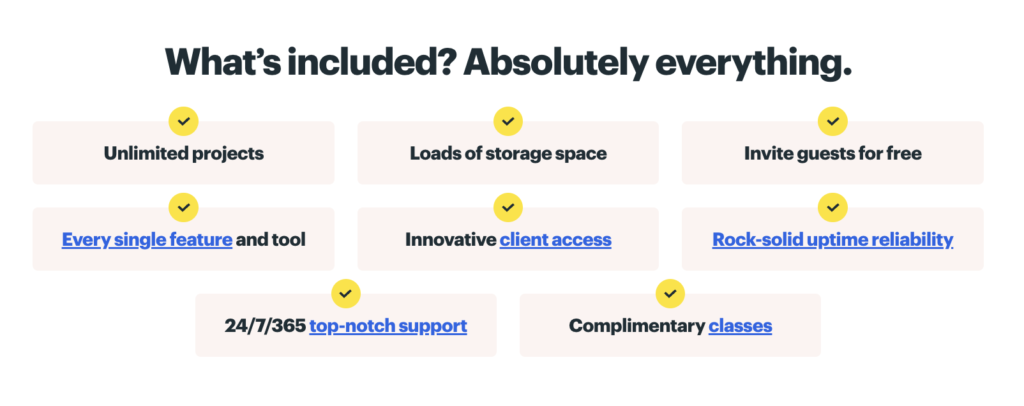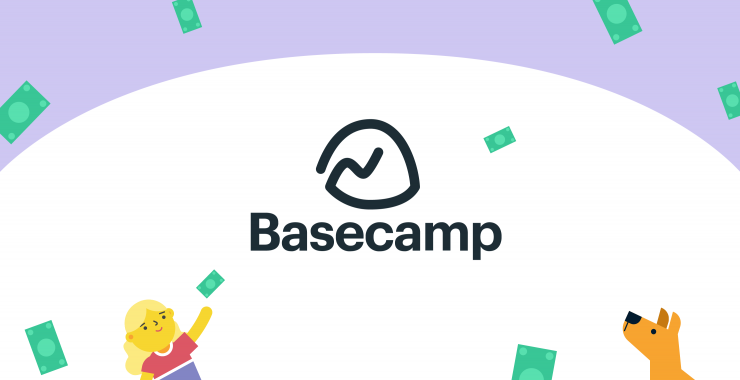Basecamp is one of the oldest project management platforms out there, founded in 1999, which makes it only a year younger than PayPal. Since then, it has grown to become a top competitor in the space, with over three million users to date.
The Chicagoan company has gone through multiple Basecamp pricing systems over the past two decades. For this article, we’ll only concern ourselves with the current plan structure since that’s all that matters for our loyal readers who want to save some money on their subscriptions.
We’re going to go over the differences between the two pricing plans, the limitations of each, as well as some alternative project management software that you might want to consider if Jason Fried’s renowned solution isn’t right for you.
Be sure to read the guide all the way through to get the full benefit and share it with a friend or two afterward so they too can cut down on their overhead costs. Without further ado, let’s get right into it!
Basecamp pricing plans
Basecamp’s pricing system is remarkably simple, since there are only two plans available: one for startups, freelancers, or small teams, and another for growing or larger businesses and companies. The former is a more pocket-friendly option for those with simpler needs, while the latter is Basecamp’s premium offering.
Basecamp’s startup plan is for $15/user/month, while Basecamp Pro Unlimited has a flat rate of $299/month (billed annually)—this means they charge you a fee of $3588 annually for unlimited members.
Being able to invite an unlimited number of users without paying more has always been a selling point for them.

Big teams actually pay less for Basecamp than they would if they subscribed to a similar service with per-user pricing. The Basecamp homepage estimates that companies would pay over four times the price for similar functionality if they used other applications for their needs.
This estimate wasn’t even for a huge corporation, just a team of 10 people. We’ll dive deeper into the limitations of the plan for freelancers, startups, or smaller teams below, but for now, let’s take a quick look at the benefits that the Basecamp Pro Unlimited subscription can bring:
- 10x file & document storage (5 TB)
- Priority support with the Basecamp customer service department
- Dedicated team workspaces
- Client viewing permissions
- Option to pay annually by check
- Annual billing for simplified accounting
Basecamp for freelancers, startups, or smaller team pricing plan limitations
The good folks who spend hundreds of days each year developing Basecamp deserve to be compensated more for all their hard work. This is why it’s not surprising that some features are reserved for the premium plan; otherwise, no one would upgrade!
Honestly, the smaller business plan is the best compromise between user accessibility and company sustainability. In the interest of keeping the business afloat, the limitations below have been set for the Basecamp pocket-friendly plan:
Billed per user
The website literally says, “great for personal projects, students, freelancers, families, and light use,” so we’re not in a position to criticize the company for limiting features or charging per user here.
If you think the capacity isn’t enough for your current team, or you plan on expanding with new employees soon, then you’d probably be best off going for the premium plan. Otherwise, this restriction is not only reasonable but easy to ignore if you’re an SMB.
Month to month pay
The startup plan only allows you to make payments monthly and not annually. So every month, you will be billed for the number of users you have on the team using Basecamp.
If you’re more of an annual payer, then this may bother you to pay every single month. Sometimes, small companies don’t have the required money to pay off the bills every month and prefer to pay it all at once annually.
However, if you’re a freelancer or a company with 10 members, then giving $15-$150 every month shouldn’t bother you a lot.
Again, it all depends on how your business is performing and how you like to finance your options.
500 GB storage space
We can’t be too hard on Basecamp, since it was nice of them to increase the storage from 1 GB to 500 GB with this new pricing plan. That being said, even though 500 GB is a lot, it still may not be a lot for those who plan on working with hefty files.
If your team primarily uploads Word documents and other file formats with a medium-sized footprint, then 500 GB of storage shouldn’t feel too cramped. However, companies that handle very large video editing projects would need some extra space.
In fact, 4K video takes up a gigabyte of storage for every minute of footage if you’re filming at 30 frames per second. Shooting at 4K60 will take up even more space. It all comes down to what your company does and how much storage it realistically needs to function.
Note: If all else fails, you can always keep your files on a separate storage platform like Dropbox or Google Drive.
An interesting twist in the recent pricing plans

There has been an interesting twist with the recent upgrade of pricing plans. Before when they had a free plan, the features were limited with a user cap, number of projects, and only 1 GB of storage.
Now, with two new pricing plans, they have integrated most of the features in both the plans and only made some minor differences for the pro or startup plan.
These differences include the upgrade of storage space, having a dedicated support line that trains your employees to onboard on the tool, and the option to pay both annually or monthly in the pro plan. With the startup plan, you can only pay monthly for the number of users that use the tool.
How to save money
Basecamp startup plan
The most obvious way to save money on your Basecamp subscription is to stick with the startup plan instead of upgrading. Of course, this only applies to businesses that don’t need the extra features that come with the premium tier, but it’s still worth noting.
However, recently, the company has merged almost all features for both plans. Only a couple of them are different, such as the storage, annual vs monthly pay, and a dedicated support or on-boarding process.
You can always switch to the Basecamp Pro plan when the time comes if the needs of your organization become too diverse down the road or if the team size exceeds the features offered by the Startup plan. In the meantime, enjoy the extra money that the startup plan will leave in your pocket.
Free trial
Making use of free trials is a no-brainer, since it saves you from wasting your money on software only to realize that it doesn’t align with your needs. Basecamp’s trial doesn’t even require a credit card, so there’s no reason not to try it out.
Even if you’re already 100% certain that Basecamp Pro plan is the project management platform for you, we’d still recommend that you go for the 30-day free trial first. By doing so, you’ll lower your total first-year cost by $299/month.
Note: Basecamp has publicly stated on their website that they’re willing to extend trials.
Promo codes
Another way to save money when upgrading to Basecamp Business Pro plan would be to find some promo codes on websites like Coupons.com and RetailMeNot. It won’t be anything significant, but getting $10 off on your first premium month is better than nothing.
If you’ve been using the free version for some time, you could even try to reach out to the Basecamp team to see if they’re willing to give you a discount when you upgrade. It’s a long shot but it’s worked for other software platforms like AND CO in the past.
Nonprofit and education discounts
Those running a 501(c)(3) nonprofit organization can get 10% off their subscription. This is on the condition that the Basecamp account is used exclusively for nonprofit work. All you have to do is email a copy of your 501(c)(3) paperwork over to nonprofits@basecamp.com.
Students and teachers at a K–12 school or university get an even better deal: it’s free. The same exclusivity restriction applies, which means you can’t use the account for unrelated projects. Students and teachers can email their proofs to students@basecamp.com.
Picking a Basecamp alternative
This is usually the part of the pricing guide where we put together a fancy-schmancy table like something straight out of a GetVoIP software alternatives piece. Not this time, as we already have a comprehensive article that covers six great Basecamp alternatives!
Conclusion
As you can see, you don’t have to break the bank to leverage the functionality that Basecamp brings. Many smaller companies will be fine with the Basecamp startup plan and thus be able to utilize the software without paying much.
Even those who are large enough to warrant the premium subscription can still minimize the cost by billing annually. Ultimately, there’s something for everyone, and I’d be hard-pressed to think of a reason why a business wouldn’t use Basecamp.











Add comment